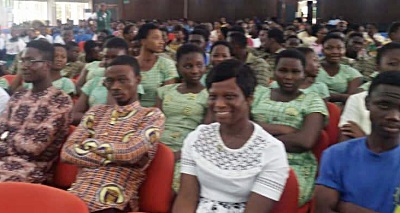
The maiden edition of the Nana Yaa Asantewaa Memorial lectures has been held under the theme, “Women, challenging the heights of governance and leadership in Africa: The icon of Nana Yaa Asantewaa.”.
Organised by the Yaa Asantewaa Foundation, it precedes a festival, Yaa Asantewaa Festival, which would soon be held in honour of the late Queen Mother of Ejisu, in the Ashanti Region to boost tourism in Ghana.
Speaking at the lectures, on a sub-theme, “Advancing the tourism sector in Ghana: The relevance of Yaa Asantewaa Festival,” a former Dean of the Faculty of Industrial Art of the Kwame Nkrumah University of Science and Technology (KNUST), Mrs Vesta Adu Gyamfi, noted that a Yaa Asantewaa festival is long overdue because it would advance the tourism sector beyond expectation “when it is uniquely planned and structured.”
She, therefore, proposed that the festival should be solely for women stressing “for the festival to achieve its objective of enhancing tourism in Ghana, especially in Ashanti, I propose first and foremost that it should be a solely women’s affair, it is time to reshape history, to let men know that there is an exclusive festival for women in Ghana.”
In her view, the festival should target every class of woman- young, old, literate, illiterate, professional, non-professional in the society, not only women of substantial achievements in Ghana, but also of those in the Diaspora, queen mothers and female leaders in politics, education, health and healing sector, banking and entrepreneurship.
She said the festival should be structured to attract female artists and artistes-drummers, dancers and musicians and should feature exclusively traditional female games from ampe to aso, hide and seek, storytelling and tug-of-peace, wrestling and football matches, contests in traditional food cooking, kaba and kente wearing, warrior’s outfit and dance.
Mrs Adu Gyamfi indicated that the festival should ban an exceptional contribution from the chiefs, queens and people of Ejisu and Ashanti and it should pay homage to the Asante heroine, Nana Yaa Asantewaa, for the bravery and gallantry she displayed which signaled to the colonialists that a woman could dare the power of the British.
According to her, the festival should also include periods of recognition and awards to women – young and old who distinguished themselves in their fields of endeavour wherever they find themselves and it should award the male counterparts who are sympathetic to the cause of women and work to promote the gender cause.
“The celebration of the Yaa Asantewaa Festival, must therefore be of great importance, because the achievement of Nana Yaa Asantewaa is a reflection of what the African woman can do, it should serve as a living example for all African women to seek emancipation from physical, mental, psychological and all forms of social and political injustices,” she opined.
Nana Yaa Asantewaa can appropriately be described as the first African Female General who led the Asante army to fight the British for encroaching on the rights and privileges of the people of Asante, at a time when men had given up.
As a queen mother of Ejisu from 1860s, her uniqueness was revealed in her ability to play dual roles as both a chief and a queen after the arrest and deportation of her grandson, the Ejisuhene, to the Seychelles Island alongside the Asantehene, Prempeh I.
After the deportation, the entire Asante Kingdom was threatened when Sir Frederick Hodgson, the then Governor of the Gold Coast, sent troops on three different occasions to demand the Golden Stool.
This action threatened the entire foundation of the great Kingdom of Asante, but Nana Yaa Asantewaa stood up and galvanised the people to fight for the defence of the Sikadwa Kofi and for the liberation of the Asante Kingdom.
Responding to a question, the chairman of the Yaa Asantewaa Foundation, Mr. Yaw Boadu-Ayeboafo, said to increase the number of women in parliament for instance, there was the need to adopt the proportional representation where a list is prepared for an election and base on the number of votes, the seats are allocated to ensure parity in gender “you list one man, one woman.”
FROM KINGSLEY E. HOPE, KUMASI







